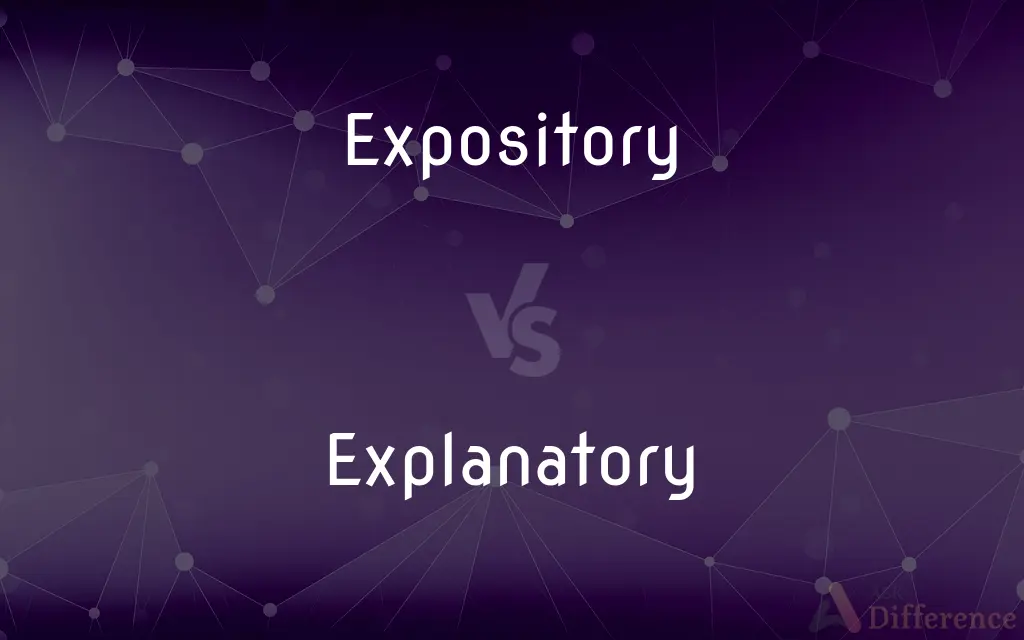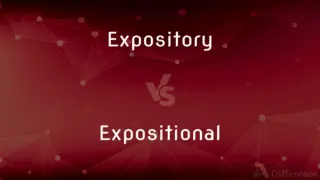Expository vs. Explanatory — What's the Difference?
By Tayyaba Rehman — Updated on August 19, 2023
Expository writing seeks to inform and provide a detailed explanation on a topic, while explanatory writing focuses on clarifying or making something understandable.

Difference Between Expository and Explanatory
Table of Contents
ADVERTISEMENT
Key Differences
Expository writing aims to inform the audience about a particular topic or subject, diving deep into the details. Explanatory writing, on the other hand, focuses primarily on offering clarity about a specific concept or event, ensuring the audience comprehends it.
Expository writing is often structured, leading the audience step-by-step through a topic, offering insights, and presenting evidence. Explanatory writing, contrastingly, seeks to break down complex ideas or events into simpler terms. Its main goal is to ensure the reader or viewer understands the underlying concept.
At the heart of expository writing is the presentation of facts, figures, and logical reasoning. It's comprehensive and detailed, leaving no stone unturned. Explanatory writing, while also fact-based, leans more towards simplification, ensuring concepts are digested easily.
In the context of their purposes, expository writing can be likened to teaching someone the intricate details of a subject, while explanatory writing is more like explaining the basic idea of a complicated topic to a friend. Both are essential styles in the world of communication, with one delving deep and the other ensuring clarity.
Comparison Chart
Purpose
Inform about a topic in depth
Clarify or simplify a concept
ADVERTISEMENT
Structure
Structured and detailed
More straightforward
Use Cases
Essays, textbooks, research
Quick guides, overviews
Focus
Facts, figures, logical reason
Simplification of complex ideas
Outcome
Comprehensive understanding
Basic comprehension
Compare with Definitions
Expository
The art or technique of composing such discourses.
Explanatory
Intended to describe or interpret something.
The explanatory diagram showed how the machine worked.
Expository
Serving to explain, explicate, or elucidate; expositive; of or relating to exposition.
Practicing expository writing will teach you to explain complex concepts clearly.
Explanatory
Serving to explain or make clear.
He provided an explanatory note to clarify his earlier statement.
Expository
Relating to, or containing, detailed explanation.
The expository section of the textbook was particularly helpful.
Explanatory
Providing a reason or cause.
The scientist's explanatory hypothesis was well-received.
Expository
Serving to expound or set forth information.
His expository skills in the lecture were commendable.
Explanatory
Making something understandable or clear.
She had an explanatory manner that made difficult subjects easy to grasp.
Expository
A public exhibition or show, as of artistic or industrial developments.
Explanatory
Intended to serve as an explanation.
Below the diagram is an explanatory text.
Expository
A form of writing intended to set forth or explain in detail.
The expository essay she wrote earned her an A due to its thoroughness.
Explanatory
Relating to the act of elucidating or clarifying.
The explanatory guidebook was a must-have for all tourists.
Expository
A statement or rhetorical discourse intended to give information about or an explanation of difficult material.
Explanatory
(of a person) Disposed to explain.
Expository
Pertaining to, or containing, exposition; serving to explain; explanatory; illustrative; exegetical.
A glossary or expository index to the poetical writers.
Explanatory
Serving or intended to explain
An explanatory paragraph.
Expository
Designed to communicate information or knowledge.
The documentary had an expository tone, educating viewers about wildlife.
Explanatory
Serving to explain; containing explanation; as explanatory notes.
Expository
The part of a play that provides the background information needed to understand the characters and the action.
Explanatory
Serving or intended to explain or make clear;
Explanatory notes
An explanatory paragraph
Expository
Concerned with providing a clear understanding of a topic.
The teacher's expository approach made complex topics seem easy.
Expository
The first part of a composition in sonata form that introduces the themes.
Expository
A setting forth of meaning or intent.
Expository
An act or example of exposing.
Expository
Serving to expound or set fourth;
Clean expository writing
Expository
The opening section of a fugue.
Common Curiosities
Can expository writing include opinions?
Typically, expository writing sticks to facts and evidence. It doesn't delve into personal opinions, instead relying on comprehensive research and logical reasoning.
How can I recognize explanatory writing?
Look for content that breaks down ideas into simpler terms or focuses on helping the reader understand a specific concept.
When might one use explanatory writing?
Explanatory writing is ideal when breaking down complex ideas or concepts, especially when the target audience might be unfamiliar with the subject.
Are personal anecdotes common in explanatory writing?
While not a primary feature, personal anecdotes can be used in explanatory writing if they help clarify or illustrate a point.
Is it possible for a piece of writing to be both expository and explanatory?
Yes, a piece can be detailed (expository) while also clarifying specific complex ideas (explanatory).
What is the primary purpose of expository writing?
Expository writing's main objective is to provide a detailed explanation or information about a specific topic, ensuring the reader has a thorough understanding.
Is expository writing only used in academic settings?
No, expository writing can be found in various places, from textbooks and essays to articles and documentaries.
How does explanatory writing differ from expository?
While both provide information, explanatory writing focuses on simplifying complex concepts, ensuring they are easily understood by the reader.
Which is more straightforward, expository or explanatory writing?
Explanatory writing is typically more straightforward as it focuses on making complex ideas easier to grasp.
Does expository writing always need to be long and detailed?
No, while it's in-depth, expository writing can be concise if it effectively conveys information.
Share Your Discovery

Previous Comparison
Expository vs. Expositional
Next Comparison
Pudding vs. ParfaitAuthor Spotlight
Written by
Tayyaba RehmanTayyaba Rehman is a distinguished writer, currently serving as a primary contributor to askdifference.com. As a researcher in semantics and etymology, Tayyaba's passion for the complexity of languages and their distinctions has found a perfect home on the platform. Tayyaba delves into the intricacies of language, distinguishing between commonly confused words and phrases, thereby providing clarity for readers worldwide.
















































